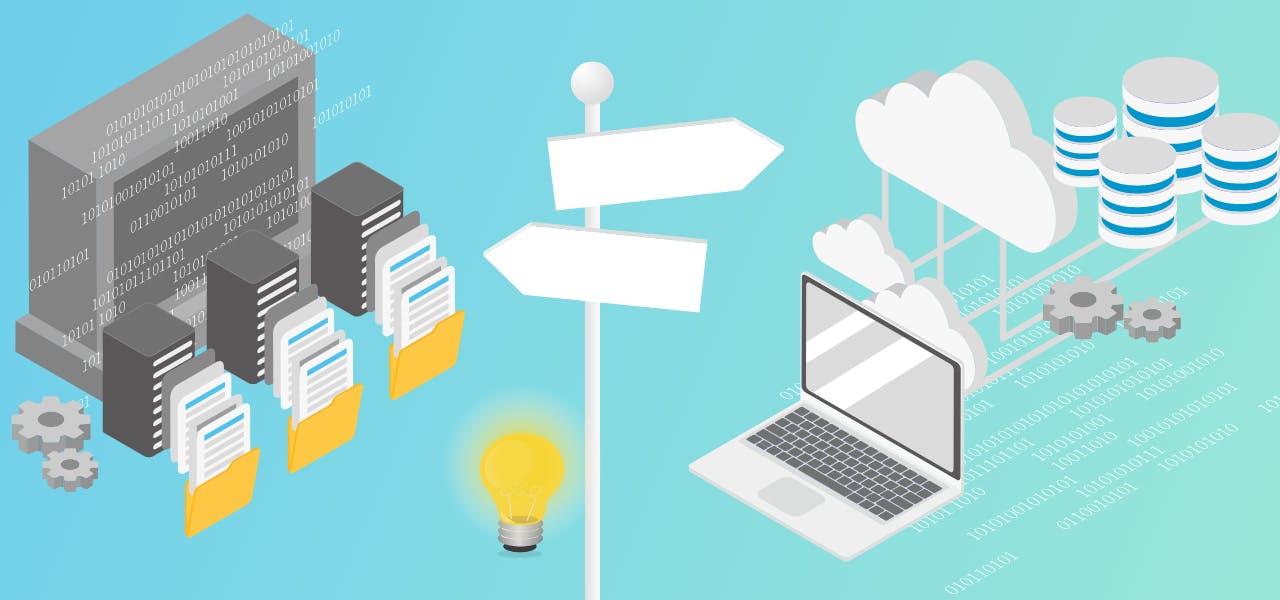Legacy vs Cloud Computing: When It Makes Sense to Stay With Legacy

Cloud computing has been on the rise for years, but 2020 is the year it truly came into its own. As the coronavirus pandemic forced employees to work from home in record numbers, cloud computing became a critical component for companies looking to stay operational and productive.
As a result, companies have been moving to the cloud in record numbers. According to reports, 67% of enterprise infrastructure could be cloud-based by the end of 2020. In addition, it’s estimated that 85% of businesses use the cloud to some degree, while 94% of the internet workload will be cloud-based in 2021.
Benefits of Cloud Computing
There are a number of reasons why cloud computing has become such a powerful option, reasons that go above and beyond the pandemic or remote work.
Scalability
One of the major benefits of cloud computing is scalability. Unlike legacy systems, cloud computing doesn’t require a company to invest millions in hardware and software to get up and running.
Instead, with cloud computing a company can purchase the resources they need as they need them. This includes infrastructure as a service (IaaS), platform as a service (PaaS) and software as a service (SaaS).
Security
Another significant benefit of cloud computing is security. Critics of cloud computing often have a hard time imagining how security can be improved by having everything in the cloud.
According to RapidScale, however, some 94% of businesses saw their security improve when they moved from legacy systems to the cloud.
Backup and Disaster Recovery
By its very nature, cloud computing is an excellent way to improve backup and disaster recovery strategies. Because everything resides in the cloud, on remote servers, data is automatically insulated from local disasters and crises.
Similarly, backups are often easier with cloud computing than legacy systems. With modern cloud platforms, the entire stack can easily be cloned and restored.
Cost
When taken together, the above factors add up to considerable cost savings for the vast majority of customers. The industry’s pay-as-you-go approach ensures that companies only pay for what they need, and don’t tie up valuable resources on unnecessary infrastructure, hardware and software.
The Case For Legacy Systems
Despite the obvious advantages to the cloud, there are times when sticking with legacy systems makes more sense.
Security
Despite the overall security cloud computing provides, there are some situations where legacy systems have an advantage.
For example, some companies routinely work with classified information, company secrets or other sensitive information that cannot be put on the cloud. In some cases, the information may be sensitive enough that it must reside on air-gapped computers. Needless to say, these scenarios are not compatible with cloud computing.
Highly Customized Solutions
While young companies often start out using cloud computing platforms as a way to avoid costly startup fees, many companies that use legacy systems have already spent that money years, or even decades ago.
What’s more, many of those companies paid for a solution that is highly customized and tailored to their business. As a result, it may be difficult and costly to completely recreate their workflow using cloud resources, while maintaining the high degree of customization they already enjoy.
It Works
Another closely related reason to stick with legacy systems is because, in some cases, they simply work. The old adage ‘if it isn’t broke, don’t fix it’ comes into play.
While the cloud may offer many advantages over legacy systems, they’re only advantages if they’re needed. If not, moving to the cloud simply becomes a major expense for no real benefit.
Existing Code and Processes
Many companies have existing codebases, processes and systems that have been in place for years. As a result, it can be a monumental task to move those codebases and systems to the cloud.
Especially if the existing system is working well, this is another scenario where the cloud may not offer enough advantage to offset the cost of completely revamping those systems.
Interacts With Other Legacy Systems
In some cases, a company’s legacy systems may interact and depend on additional legacy systems, either within the company or outside of it. As a result, it may not make sense to move them to the cloud and then try to create a way for the systems to interface.
Conclusion
Without a doubt, cloud computing offers a number of significant advantages over legacy systems. Especially for companies just starting out, there are relatively few reasons to choose anything other than a cloud-based setup.
For older, more established companies, however, it’s not always so clear-cut. There are many circumstances where moving to the cloud can be an unnecessary, costly and productivity-inhibiting exercise. As a result, each company’s personnel must carefully weigh the pros and cons and make the best decision for their circumstances.
Related Articles

Cloud computing has been on the rise for years, but 2020 is the year it truly came into its own. As the coronavirus pandemic forced employees to work from home in record numbers, cloud computing became a critical component for companies looking to stay operational and productive.
As a result, companies have been moving to the cloud in record numbers. According to reports, 67% of enterprise infrastructure could be cloud-based by the end of 2020. In addition, it’s estimated that 85% of businesses use the cloud to some degree, while 94% of the internet workload will be cloud-based in 2021.
Benefits of Cloud Computing
There are a number of reasons why cloud computing has become such a powerful option, reasons that go above and beyond the pandemic or remote work.
Scalability
One of the major benefits of cloud computing is scalability. Unlike legacy systems, cloud computing doesn’t require a company to invest millions in hardware and software to get up and running.
Instead, with cloud computing a company can purchase the resources they need as they need them. This includes infrastructure as a service (IaaS), platform as a service (PaaS) and software as a service (SaaS).
Security
Another significant benefit of cloud computing is security. Critics of cloud computing often have a hard time imagining how security can be improved by having everything in the cloud.
According to RapidScale, however, some 94% of businesses saw their security improve when they moved from legacy systems to the cloud.
Backup and Disaster Recovery
By its very nature, cloud computing is an excellent way to improve backup and disaster recovery strategies. Because everything resides in the cloud, on remote servers, data is automatically insulated from local disasters and crises.
Similarly, backups are often easier with cloud computing than legacy systems. With modern cloud platforms, the entire stack can easily be cloned and restored.
Cost
When taken together, the above factors add up to considerable cost savings for the vast majority of customers. The industry’s pay-as-you-go approach ensures that companies only pay for what they need, and don’t tie up valuable resources on unnecessary infrastructure, hardware and software.
The Case For Legacy Systems
Despite the obvious advantages to the cloud, there are times when sticking with legacy systems makes more sense.
Security
Despite the overall security cloud computing provides, there are some situations where legacy systems have an advantage.
For example, some companies routinely work with classified information, company secrets or other sensitive information that cannot be put on the cloud. In some cases, the information may be sensitive enough that it must reside on air-gapped computers. Needless to say, these scenarios are not compatible with cloud computing.
Highly Customized Solutions
While young companies often start out using cloud computing platforms as a way to avoid costly startup fees, many companies that use legacy systems have already spent that money years, or even decades ago.
What’s more, many of those companies paid for a solution that is highly customized and tailored to their business. As a result, it may be difficult and costly to completely recreate their workflow using cloud resources, while maintaining the high degree of customization they already enjoy.
It Works
Another closely related reason to stick with legacy systems is because, in some cases, they simply work. The old adage ‘if it isn’t broke, don’t fix it’ comes into play.
While the cloud may offer many advantages over legacy systems, they’re only advantages if they’re needed. If not, moving to the cloud simply becomes a major expense for no real benefit.
Existing Code and Processes
Many companies have existing codebases, processes and systems that have been in place for years. As a result, it can be a monumental task to move those codebases and systems to the cloud.
Especially if the existing system is working well, this is another scenario where the cloud may not offer enough advantage to offset the cost of completely revamping those systems.
Interacts With Other Legacy Systems
In some cases, a company’s legacy systems may interact and depend on additional legacy systems, either within the company or outside of it. As a result, it may not make sense to move them to the cloud and then try to create a way for the systems to interface.
Conclusion
Without a doubt, cloud computing offers a number of significant advantages over legacy systems. Especially for companies just starting out, there are relatively few reasons to choose anything other than a cloud-based setup.
For older, more established companies, however, it’s not always so clear-cut. There are many circumstances where moving to the cloud can be an unnecessary, costly and productivity-inhibiting exercise. As a result, each company’s personnel must carefully weigh the pros and cons and make the best decision for their circumstances.
Related Articles
